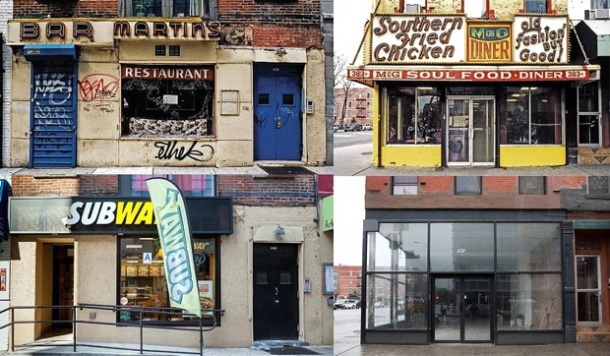Before and After Pictures of NY Storefronts Document a Decade of Gentrification
As stated before, I love Franz Fanon’s work, lol, So I decided to share an article that I read long before learning about him. Hearing about colonization, this article came to mind. Gentrification is running Rapid in our communities here in the city. Linked above you will find a great article that visually illustrates what happens when gentrification is on the come up. We see store fronts of mom and pop shops turned into sub-ways or upscale cafe’s. While these look really pretty and from an orthodox point of view they seem to be beneficial for the community: ITS NOT.
Usually when people hear the word gentrification, they automatically think of Harlem. Linked here is another article that gives some insight into gentrification in Harlem: http://www.businessinsider.com/new-yorks-east-harlem-gentrification-photos-2013-9?op=1
Now, who wouldn’t be excited to see a nice Whole Foods in their neighborhood? Well a nice whole foods comes at a price. The arrival of this whole foods is the start of a battle for resources: families in the surrounding area, if not granted rent control or are fortunate to own a house, these families can be priced out of their communities, forced to move often at a short moments notice. We see traditional mom-and pop shops in the area going out of business because the new group of residents that are able to afford the new housing prices are not shopping at smaller shops but traveling to larger malls. Here we see that the money is not being circulated back into the community. We also observe a slow move away from the culture of the original community; while families are forced to move, they take their culture with them, or if they are able to stay new residents will not appreciate the cultural practices, such as a traditional drum circle, or the weekly block parties during the summer. While these elements of the neighborhood cease to exist we end up with a community that is void of originality, it becomes homogeneous in terms of the people that inhabit the area and the visual appeal of the neighborhood.
Now to relate all of this to Fanon: how can colonization even be compared to gentrification? Well, if we think about colonization as simply as the take over of resources and land, this is exactly what we see happening in urban neighborhoods. With the neoliberal ideals that we seemingly accept, gentrification may not seem like a problem, but it leads to the people being removed from where they are for the greater economic gain. Once these people are priced out of their neighborhoods, where do these people go? What will happen to the culture? How is one to navigate the world when they have to be uprooted and adjust to a new reality that they have to face in which once has to realize that the space that they occupy is not their own?
With all of these questions, how can we prevent gentrification, or perhaps prevent individuals from facing psychological hardships that result from displacement? Working in the south bronx and speaking with local organizations one of the ideas that an organization has implemented was to create an after school program for mothers in which they will watch children and provide free food as many of the mothers have to work long hours and do not have the opportunity to watch their children after school. This model creates a huge relief for working families in that they do not have to worry about their children.
What other initiatives would you implement to alleviate some of immediate hardships that families will have to face if they are priced out of their homes due to gentrification?


When we read Fanons work and he speaks about colonization and how in order for that to take place decolonization must also take place I get that it makes sense but when I think of gentrification it’s a little hard to connect it with Fanons colonization because it doesn’t include violence …hmm
Oh yes, hmm, I would like to propose that we expand our one dimensional notion of violence as being more than just physical hurt against someone, but also as a structural force. I believe that colonialism and gentrification are both rooted in neoliberalism and therefore they have the same premise, using policy to help a few and leaving other without the ability to create a stable life for themselves. The term colonialism seems so “dated”, but it still exists if we realize that core meaning of colonization is to take over resources and as a result removing people from their land and culture. The violence that comes with gentrification may not be out right with the shooting of people, people being held captive, or the scapling of natives, we still have violence against the native people: they become criminalized in their own neighborhoods: police officers profiling them, they are not able to walk into the fancy new stores that are built in the neighborhood without being followed around, I think these can be considered violence, again, structural violence (if you choose to accept that term): People are being intentionally priced out of their homes for the sake of neoliberal urban development policies. This ill intention is violence against ones lively hood. http://forumonpublicpolicy.com/summer08papers/archivesummer08/wharton.pdf